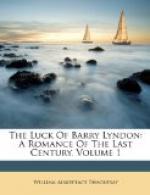It was hither we came after the Mannheim misfortune. The nobility of the Court were pleased to say our reputation had preceded us, and the two Irish gentleman were made welcome. The very first night at Court we lost 740 of our 800 louis; the next evening, at the Court Marshal’s table, I won them back, with 1300 more. You may be sure we allowed no one to know how near we were to ruin on the first evening; but, on the contrary, I endeared every one to me by my gay manner of losing, and the Finance Minister himself cashed a note for 400 ducats, drawn by me upon my steward of Ballybarry Castle in the kingdom of Ireland; which very note I won from his Excellency the next day, along with a considerable sum in ready cash. In that noble Court everybody was a gambler. You would see the lacqueys in the ducal ante-rooms at work with their dirty packs of cards; the coach and chair men playing in the court, while their masters were punting in the saloons above; the very cook-maids and scullions, I was told, had a bank, where one of them, an Italian confectioner, made a handsome fortune: he purchased afterwards a Roman marquisate, and his son has figured as one of the most fashionable of the illustrious foreigners in London. The poor devils of soldiers played away their pay when they got it, which was seldom; and I don’t believe there was an officer in any one of the guard regiments but had his cards in his pouch, and no more forgot his dice than his sword-knot. Among such fellows it was diamond cut diamond. What you call fair play would have been a folly. The gentlemen of Ballybarry would have been fools indeed to appear as pigeons in such a hawk’s nest. None but men of courage and genius could live and prosper in a society where every one was bold and clever; and here my uncle and I held our own: ay, and more than our own.
His Highness the Duke was a widower, or rather, since the death of the reigning Duchess, had contracted a morganatic marriage with a lady whom he had ennobled, and who considered it a compliment (such was the morality of those days) to be called the Northern Dubarry. He had been married very young, and his son, the Hereditary Prince, may be said to have been the political sovereign of the State: for the reigning Duke was fonder of pleasure than of politics, and loved to talk a great deal more with his grand huntsman, or the director of his opera, than with ministers and ambassadors.
The Hereditary Prince, whom I shall call Prince Victor, was of a very different character from his august father. He had made the Wars of the Succession and Seven Years with great credit in the Empress’s service, was of a stern character, seldom appeared at Court, except when ceremony called him, but lived almost alone in his wing of the palace, where he devoted himself to the severest studies, being a great astronomer and chemist. He shared in the rage then common throughout Europe, of hunting for the philosopher’s stone; and my uncle often regretted that he had no




